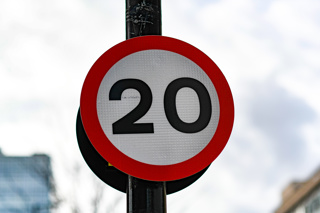Tougher penalties for those caught using mobile phones while driving have been welcomed by road safety experts and fleet sector suppliers.
From March 1, penalty points on a driving licence have doubled for the offence, from three to six, and the fine has increased from £100 to £200.
Road safety charity Brake has generally welcomed the move by the Government, but it warns the fine is still too low and it remains concerned about the police having enough resources to enforce the new law.
Gary Rae, campaigns director for Brake, said: “The increase in the points is very welcome. However, when you realise that you can be fined £1,000 for not having a TV licence, then the £200 fine for illegally using a mobile looks woefully inadequate.”
“We’re also very concerned about the ever dwindling number of roads traffic police.
"Their numbers have fallen by almost a third since 2010. There are now approximately 3,700 specialist traffic officers in England and Wales. We want the Government to look again at this, and make roads policing a national priority."
Shaun Helman, TRL’s head of transport psychology, added: "Any task that involves holding a device, looking at it, and interacting with it during driving will adversely affect driving performance.
"Typical effects are drifting out of lane, erratic speed control and being less aware of what is around you, resulting in poor anticipation of hazards.
"Recent research by TRL suggests that between 10-30% of road accidents in the EU are at least partly caused by distraction, and social media is an increasing risk in this area.
“Even simply speaking on a mobile phone can slow reaction times to sudden events, as much as being at the legal limit for blood alcohol in England (80mg/100ml of blood). Interacting with social media is even more demanding than simply speaking.
"Drink-driving is socially unacceptable because the behaviour puts not only the driver, but other road users’ lives at risk.
"Choosing to be deliberately distracted from driving by tasks such as checking social media also puts other road users at risk and should also be seen as socially unacceptable.
“We know that as mobile technology has advanced, more attention has been paid to distraction when driving.
"However, we also know that attitudes and behaviours can change for the better.
"Drink-driving was socially acceptable in the 1960s and 1970s, but now it is seen as socially unacceptable by most people.
"The same could happen with distracted driving, although the development of new technologies may provide alternative solutions.
“Obviously some people, some of the time, value their social connectivity more than they value their safety and the safety of others. It is this perspective that should be targeted.”
Peter Millichap, director of UK marketing at Teletrac Navman, said: "We welcome the legislation change, which sees a huge crackdown on drivers using mobile phones whilst behind the wheel.
"This new law will inevitably impact fleet operators, so we advise fleet managers to invest in technology which can directly and indirectly impact on reducing the risk.
“Telematics generally lessens the need for mobile communication, as managers don’t need to contact drivers by phone to check where their vehicles are, or to discuss job allocations or route planning.
“It also highlights driver behaviour - for example, if a driver is braking harshly regularly, then this may be a symptom of them being distracted, maybe because they are using their phone.
"This behaviour can they be addressed in training to ensure it doesn’t happen anymore.
“In-cab cameras are also a very powerful deterrent for drivers - the knowledge of being monitored with front facing cameras improves driver behaviour."
Research from Goodyear Tyres UK has revealed that almost a quarter (23%) of motorists said the risk of being prosecuted would not affect their mobile phone use behind the wheel.
Kate Rock, PR and corporate communications manager, said: “It’s absolutely imperative that more education is provided to make drivers aware of the potential dangers of the road and the distractions around them, so that safe driving becomes second nature.
“We have found that mobile phone use is still prominent especially in young drivers.
"Worryingly, our extensive research revealed that 42% of young drivers have admitted to using their mobile phone behind the wheel and almost one-quarter (23%) said the risk of being prosecuted would not affect this.
"Driving is a serious matter and we hope this change in law makes motorists think about their actions, to stay focused on the task in hand.”


















Login to comment
Comments
No comments have been made yet.